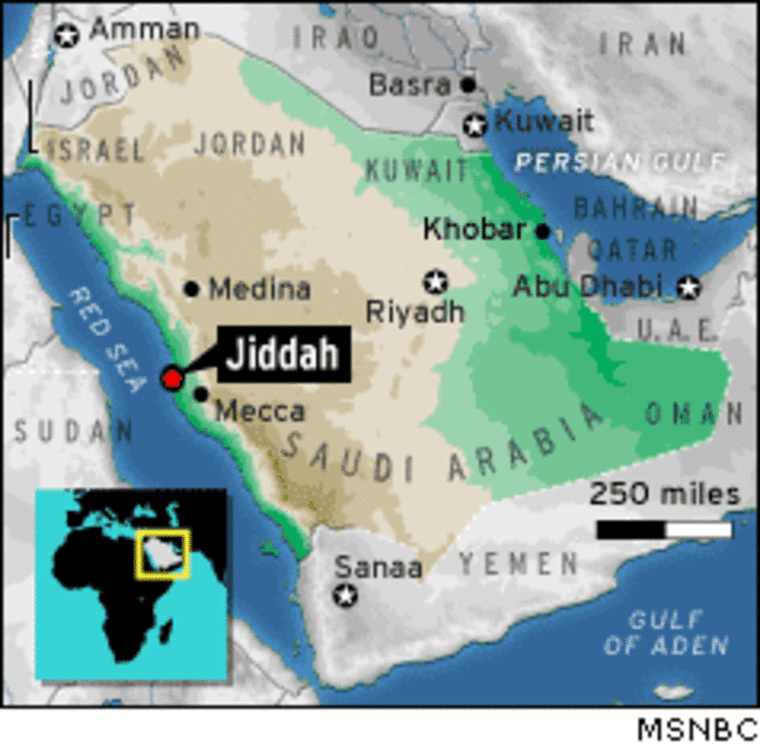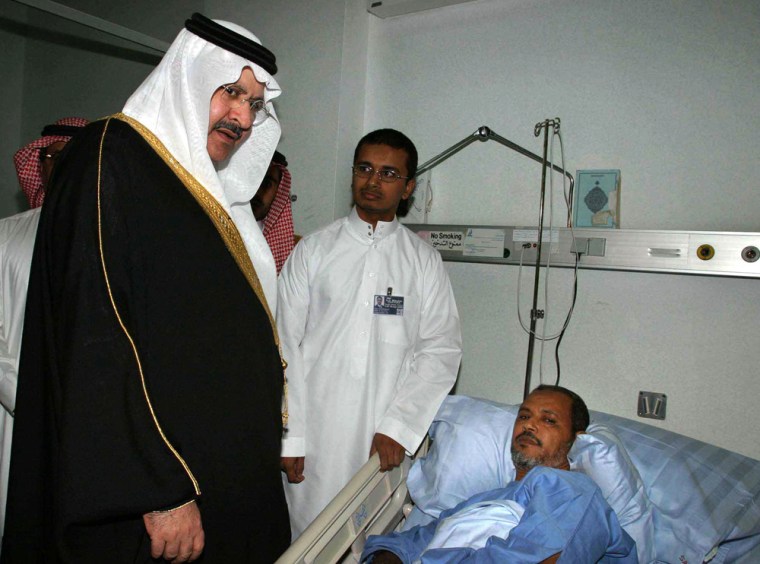Saudi Arabia’s highest religious authority on Wednesday condemned as a sin the deadly shooting rampage at a U.S. consulate, and local newspapers reported one of the slain assailants was a former employee of the nation’s religious police.
U.S. officials warned more attacks were possible, but reopened the U.S. Embassy in Riyadh on Wednesday, two days after militants stormed into the inner courtyard of a U.S. consulate in this port city firing their guns, grabbing human shields and killing five people. Four of the attackers were killed.
The injured spoke of assailants opening fire and hunting for victims with shouts of “Where are the Americans?”
Grand Mufti Abdul-Aziz al-Sheik said in a statement that anyone who enters the kingdom with the permission of its leaders has a promise of security and should not be attacked.
‘Forbidden acts and grand sins’
“What happened on Monday regarding the storming of the U.S. Consulate in Jiddah, using weapons and explosives, killing innocent souls, petrifying secure ones, and undermining security in the kingdom are all forbidden acts and grand sins,” al-Sheik said.

As Saudi Arabia’s most senior cleric, the mufti’s words carry significant weight among Saudis, though his views normally wouldn’t diverge far from the official government line.
The Saudi newspaper Al-Watan, meanwhile, reported that one of the gunmen killed in the assault had been fired from a job in Medina with the Committee for the Propagation of Virtue and the Prevention of Vice, the kingdom’s religious police. They patrol Saudi cities for signs of religious misconduct — such as a slipping veil or any mixing of unrelated men and women.
The newspaper quoted Saad Mohammed al-Sumeiry as saying his cousin, Fayez bin Awad al-Juhaini, 28-year-old school dropout, was fired for “bad behavior.”
The report did not say what his job was, when he worked there or when or why he was fired.
Calls to the main office of the religious police in Riyadh went unanswered Wednesday.
Attacker reportedly arrested, released
The newspaper also cited al-Sumeiry as saying al-Juhaini was arrested eight months ago and released to his brother’s custody.
Separately, the Okaz daily newspaper, known for its close contact with the Saudi Interior Ministry, quoted an unidentified security official as saying al-Juhaini had been arrested for his “extremist ideas.”
Upon his release, al-Juhaini disappeared, both newspapers said. His elder brother reported him missing, al-Watan said, adding that the family was refusing to accept condolences “as a sign of their condemnation to the criminal act their son committed.”
Okaz also reported al-Juhaini was believed to be the leader of the Jiddah attack and had supervised a terror cell in the Red Sea port city.
But Interior Ministry spokesman Brig. Gen. Mansour al-Turki told the Associated Press he did not believe al-Juhaini led the cell, and that it was impossible to confirm because four of the five attackers died and the fifth was gravely wounded. “There was no one to speak for the group,” he said.
He did not confirm or deny the rest of the reports.
Saudi authorities have previously said that they believe the attack may be linked to al-Qaida, the terrorist group headed by Saudi exile Osama bin Laden.
Survivors provide new details
Meanwhile, wounded U.S. consulate workers provided new details about the attack, which claimed the lives of employees from Yemen, Sudan, the Philippines, Pakistan and Sri Lanka, but no Americans.
One of the 10 wounded, Salah Abdel Qawi Alyafiee of Yemen, said Tuesday the militants held people as human shields as Saudi forces rushed in and engaged in a fierce gunbattle.
“Each one of the terrorists took a group of us and they started shooting at the (Saudi) guards,” he said. “And thanks to God, the Saudis did not shoot at random. They aimed at the terrorists.”
Alyafiee, who works as a dispatcher at the consulate, said he knelt as the firing began, and then was shot. “I don’t know whose bullet hit me,” he said. “I was on the floor and my face was to the floor.”
He said the attackers, fellow Muslims, shouted “God is great!” as they rushed in. “These people are lost,” he said sorrowfully, his left arm in a thick white cast. “They don’t know anything about their religion.”
Other wounded employees said the attackers burst into a guardhouse looking for Americans after first entering the courtyard.
‘Where are the Americans?’
“They shot our door and they went into our office,” said Abbel Gaber, a Sri Lankan man who had been hired by a local guard company. “They asked us, ’Where are the Americans?’ We said, ‘We don’t have any Americans.”’
The attackers stayed inside the office, shooting occasionally until Saudi forces arrived and a bigger shootout began, Gaber said. He was hit from behind and fell down, waking later to see two dead men nearby.
In Washington, State Department spokesman Adam Ereli warned that there could be more attacks in Saudi Arabia targeting U.S. citizens. “Maximum alertness and caution and prudence is called for,” he said.
To bolster diplomatic security, Defense Department officials said a Marine Corps anti-terror team would go to Jiddah. Typically, there are 50 Marines in such teams, trained in providing security and conducting raids in urban areas. U.S. embassies and consulates worldwide rely almost exclusively on host-nation soldiers and police or private security guards to guard their outer walls. Inside, security is provided by U.S. Marines and federal civilian officers.
